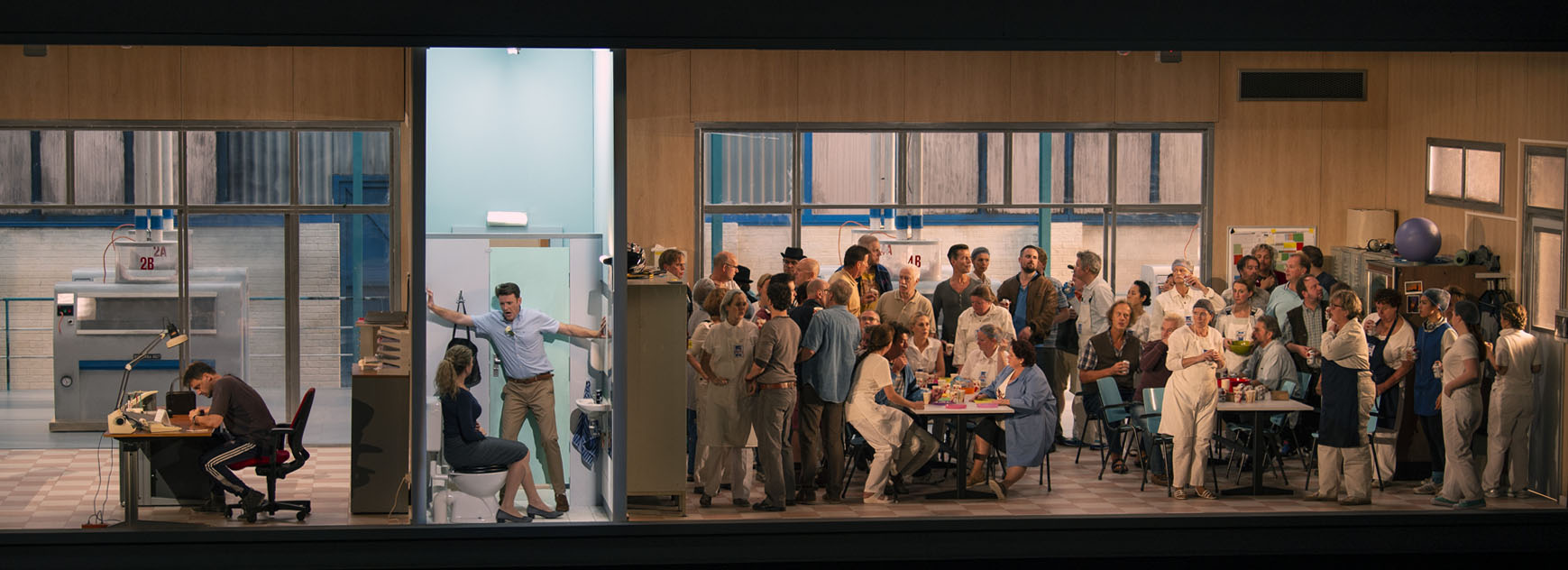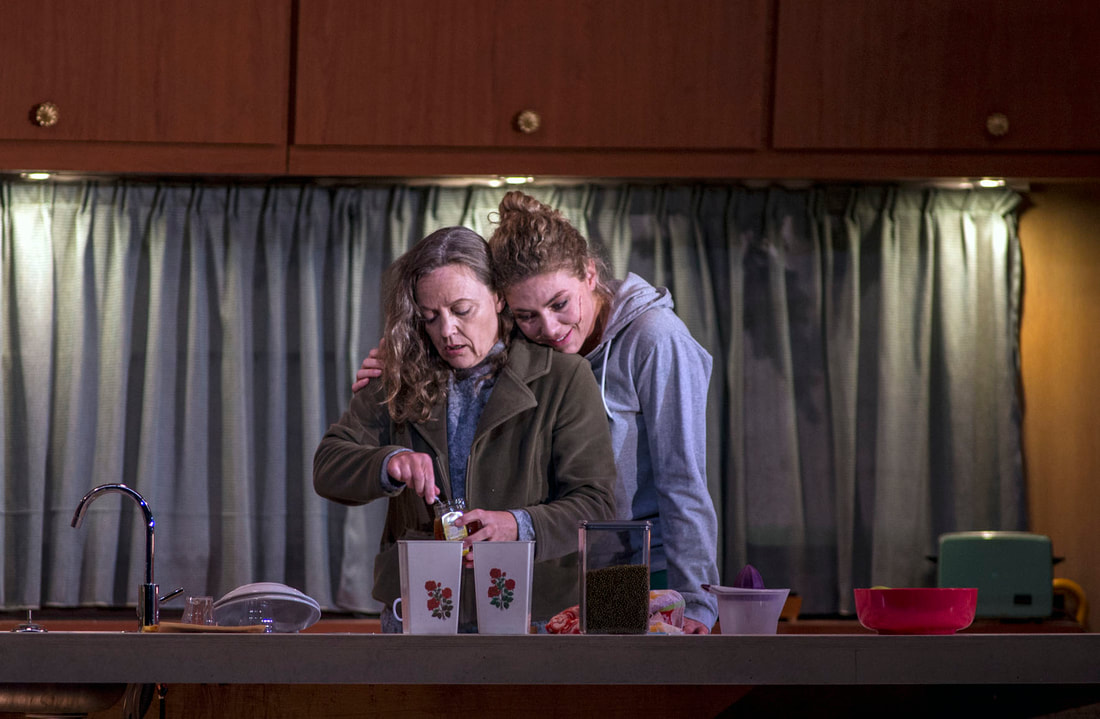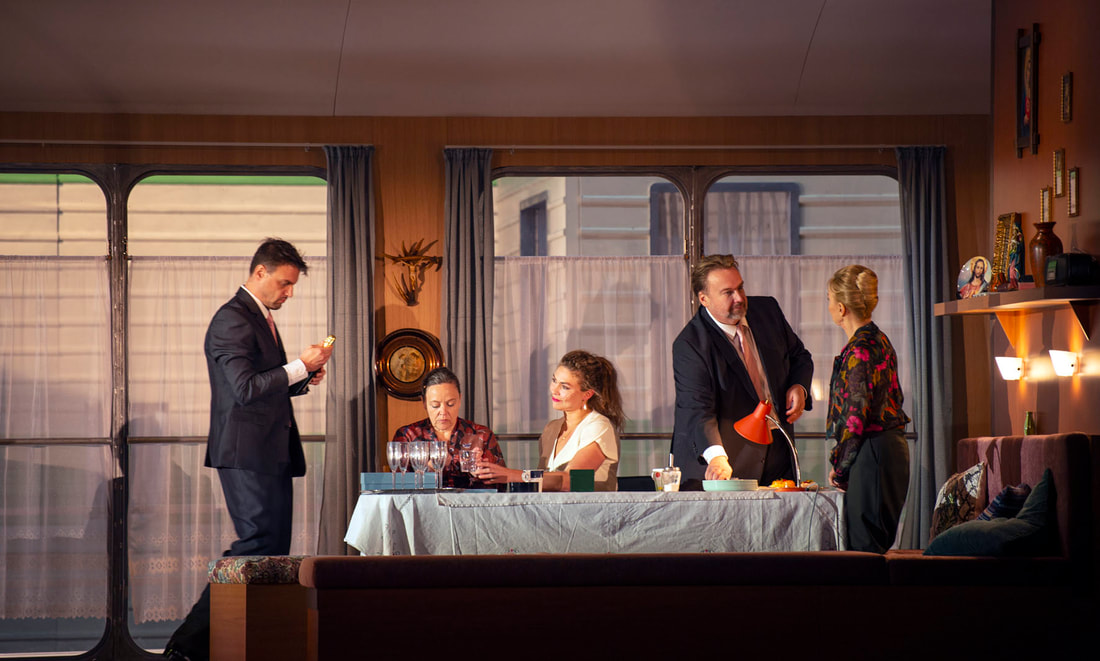Jenufa from Leoš Janáček in a regie by Katie Mitchell at the Dutch National Opera "We could have went to a nice restaurant for your birthday," she says while Anette Dasch raises her skirt and pulls her tights down. We are on the right side of the stage so we have a good sight of it. The soprano who started the evening with vomiting is sitting on the toilet. We witness in a theater a pretty realistic depiction of pregnancy sickness. It is the trademark of director Katie Mitchell who values realism in the theatre. An approach that seems to fit Jenůfa, an opera that tells about the lifes of ordinary people. OLGA Lifes in which drama is preminent. This goes for both the story of the opera as the life of its composer. For Janáček, the creative process of Jenufa occurred almost synchronously with the sick bed of his daughter Olga. Before the opera premiered in 1904, Olga had died of typhoid at the age of 21. JENUFA The man who made her pregnant leaves her and the man who says he really loves her mutilates her face with a knife. And then her stepmother, in a devastating attempt to save her stepdaughter from the mistakes she herself made in the past, murders Jenůfa's child. In the world of Jenůfa, people are trapped between social conventions and survival instincts. Here the mind finds no way, should it even dare to think about it, to elevate. The title character is the only one who dares to hope for a better future at the beginning of the opera. Before Jenůfa sees her dreams about Števa shattered, the man is loaded with money as well as a thirst for liquor, life passes her by like a soap opera. A soap opera in which the banality of everyday life is turned into high brow art (for lack of a better term) by the music of Janáček. There are some musical similarities with Salome of Richard Strauss (especially in the percussion parts), an opera that was released in the same period as Jenůfa, but more than other operas, Jenůfa - the story of a woman in a patriarchal society - makes me think of a song by the man who has (just like me) his birthday today. John Lennon and his "Woman is the Nigger of the World". KATIE Katie Mitchell sets the story in 2021 and has Anette Dasch play a 42-year-old Jenůfa (the singer's real age). It is background information that is not necessary to understand the setting and the regie. A regie in which profane and vulgar details have to emphasize the worldly character of the play - people go to the toilet more than once (thinking of a Romeo Castallucci-piece I once saw in which someone was shitting his pants - it has become a bit of a cliché to depict realism in the theatre this way). What is human must remain human - any attempt to mythologize must vehemently be avoided. The objective nature of the stage scenery (we see an interior of an office and a caravan) with its claustrophobic appearance, a world from which it is impossible to escape, ensures that the full weight of the drama falls on the shoulders of the characters and the Personenregie. Drama that is in the excellent hands of Anette Dash as Jenůfa, Hannah Schwartz as Buryjovka, Pavel Cernoch as Laca and Evelyn Herlitzius as Kostelnička (Jenufa's stepmother). Yet during the performance I am visited more than once by the idea that a certain abstraction in the design might have lifted the story a bit more above itself. That less emphasis on the tangible would have lifted the story from the stage on which it was presented. The question arises as to whether or not an overly firm pursuit of realism in the theatre not emphasizes that what is shown is, in fact, unrealistic. EVELYN Her voice was never among the largest in the field, The great Wagner roles, Brünnhilde and Isolde, she doesn't do anymore. But with the intensity she bring to her roles Evelyn Herlitzius has almost created a niche for herself. With the vocal part always firmly supported by her acting work, her roles rarely fail to leave a lasting impression. (Patrice Chéreau wanted her for the leading role in Elektra, without her he would not have began on the production that turned out to be his last opera regie.) The great monologue in the second act, in which Kostelnička reveals her motives, shares with us her own chilling logic of killing Jenůfa's child, becomes, through Herlitzius' recitation, a descent into a reality in which illusions invariably perish and experience teaches us that it is better to conform to one's destiny, away from dreams about a happy life. In the end, Jenůfa does exactly that. Her happiness is to exchange the dream of the ideal man for accepting the best option that remains - to marry the man who've cut her face with a knife. Jenůfa accepts her fate. She trades the dream of the ideal man for accepting the best option that is left for her - to marry the man who've cut her face with a knife. DIAMOND With one bang Jenůfa drops the tray with glasses on the ground, a glass bounces off the stage and miraculously lands on its leg. It is a, unintentional, graphic prediction for the ending in which everything more or less lands on its feet. Jenůfa turns out to be capable of an amount of forgivingness that would make the Dalai Lama blush (she forgives her stepmother for the murder of her child, she marries the man who wounded her with a knife). Whether the happiness that comes within her reach will remain, can seriously be doubted. It remains extremely uncertain whether her bond with Laca is a close one and whether the community will fully accept their relationship after all that has happened. "I'm glad we've seen it after all," she says at the end. Orchestra and cast have just delivered a strong piece of music theatre. Music theatre in which music and libretto are strongly intertwined. The music, you can hear a few leitmotivs in it but its use is very sparse, adds to the storytelling but refrains itself from giving too detailed a comment on the action. Whereas the music in a Wagner opera is like a Greek choir, an entity that can contextualise a scene, lies diagonally from the text in order to look forward or look backwards, in Janáček one has to rely mainly on the text for an insight into the motives of the characters and their actions. Text that blends with music and thus forms a sparkling crystal in which many colours can be seen. You do not have to master the Moravian language to get in touch with the text (for their exact meaning, the surtitles remain indispensable), although a basic knowledge of Moravian is probably necessary for a real appreciation of Janáček, his phrasing and how he unlocks musical secrets in the spoken language. Without that, it probably remains a bit like looking at the sparkling beauty of a diamond with sunglasses on. Still beautiful but a not unimportant part of the brilliance you have imagine yourself. The Dutch National Opera, 9 October 2018 Dates 10.6 - 10.25 Conductor: Tomáš Netopil Regie: Katie Mitchell Decor and costums: Lizzie Clachan Jenůfa: Annette Dasch Kostelnička Buryjovka: Evelyn Herlitzius Stařenka Buryjovka: Hanna Schwarz Laca Klemeň: Pavel Cernoch Števa Buryja: Norman Reinhardt - Wouter de Moor
0 Comments
Leave a Reply. |
TIMELINE
July 2024
|




 RSS Feed
RSS Feed